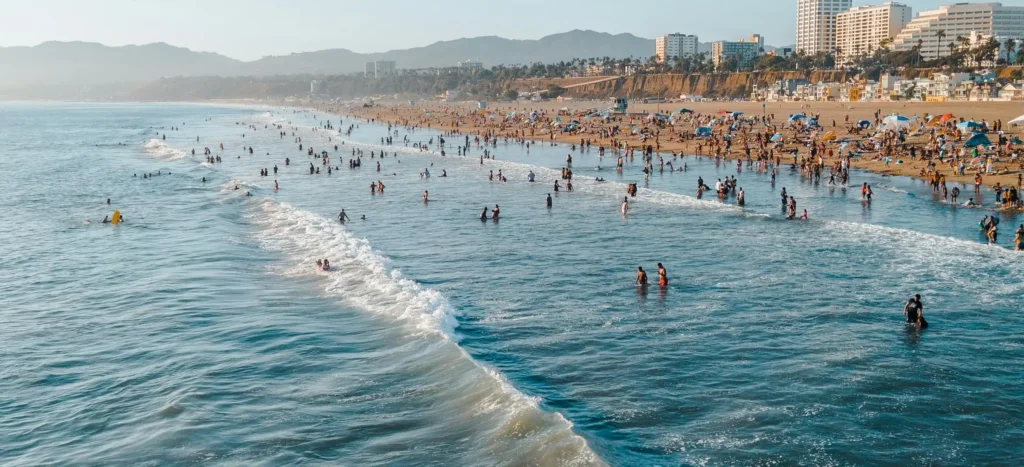|
Getting your Trinity Audio player ready...
|
As California faces yet another scorching summer, thousands of residents are seeking refuge in the cooler climes of Lake Tahoe for the Fourth of July weekend. The picturesque alpine lake, straddling the California-Nevada border, has become a hotspot for those looking to beat Lake Tahoe the heat Wave and enjoy a refreshing Independence Day celebration.
Record-Breaking Temperatures Drive Exodus
The National Weather Service has issued excessive heat warnings for much of California, with temperatures expected to soar well above 100°F (37.8°C) in many areas[1]. Los Angeles and the Central Valley are particularly affected, with some locations bracing for highs of up to 115°F (46.1°C).
In contrast, Lake Tahoe offers a welcome respite with daytime temperatures hovering around a comfortable 75°F (23.9°C)[2]. This stark difference has prompted a mass exodus from the state’s urban centers and inland valleys.

Tourism Boom for Tahoe
Local businesses in the Lake Tahoe area are reaping the benefits of this influx. Hotels, vacation rentals, and campsites report being at near capacity, with some establishments fully booked weeks in advance[3].
Carol Chaplin, President and CEO of the Lake Tahoe Visitors Authority, told reporters,
We’ve seen a significant uptick in last-minute bookings. People are desperate to escape the heat, and Tahoe offers the perfect combination of cool weather and outdoor activities.
Outdoor Activities and Events
The area’s natural beauty and numerous recreational opportunities are a major draw for visitors. Popular activities include:
- Swimming and water sports on the lake
- Hiking in the surrounding Sierra Nevada mountains
- Mountain biking on scenic trails
- Gondola rides for panoramic views
Many towns around the lake are hosting special Fourth of July events, including fireworks displays, parades, and outdoor concerts[4].
Environmental Concerns
While the tourism boom is a boon for the local economy, it also raises environmental concerns. The influx of visitors puts additional strain on the fragile alpine ecosystem.

Dr. Geoffrey Schladow, director of the UC Davis Tahoe Environmental Research Center, warns,
The sudden increase in human activity can lead to issues such as increased water pollution, trail erosion, and disturbance of wildlife. We urge visitors to be mindful of their impact and follow Leave No Trace principles.[5]
Traffic and Safety Measures
The surge in visitors has led to increased traffic on roads leading to Lake Tahoe. Local authorities have implemented special measures to manage the influx:
- Additional CHP patrols on major highways
- Temporary parking restrictions in popular areas
- Increased public transportation services
Visitors are advised to plan their trips carefully and expect delays, especially during peak travel times[6].
Climate Change Implications
While Lake Tahoe provides temporary relief from the heat, experts caution that the increasing frequency and intensity of heat waves are symptomatic of broader climate change issues.
Dr. Daniel Swain, a climate scientist at UCLA, notes,
What we’re seeing is consistent with climate change projections. These extreme heat events are becoming more common and more severe. While escaping to cooler areas provides short-term relief, it’s crucial that we address the root causes of climate change.[7]
Looking Ahead
As the holiday weekend progresses, forecasts suggest that the heat wave will persist across much of California. This means Lake Tahoe is likely to remain a popular destination throughout the summer.
Local resident Mark Thompson summed up the sentiment of many visitors:
This is the place to be. You’ve got the beautiful lake, the mountains, and weather that actually lets you enjoy being outside. It’s like a different world compared to the heat back home.
As Californians seek refuge from the sweltering temperatures, Lake Tahoe stands as a cool oasis, offering not just relief from the heat but a chance to celebrate Independence Day surrounded by natural beauty. However, the situation also serves as a stark reminder of the ongoing challenges posed by climate change and the need for sustainable tourism practices.
For More News Update Visit California News



